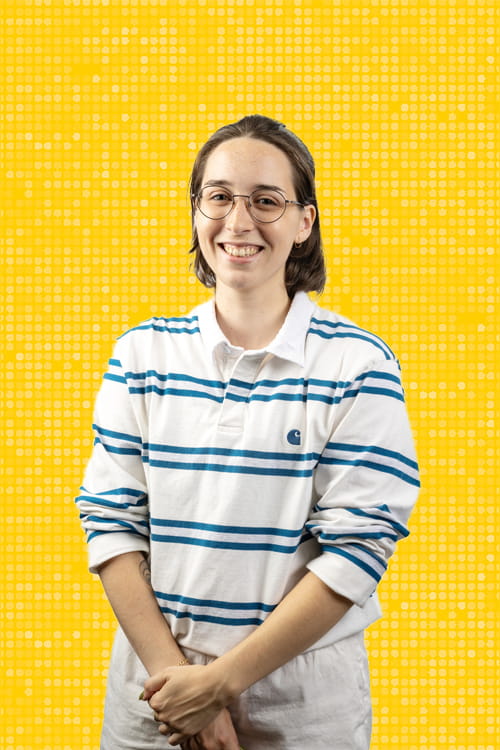
Avery Van De Water, PhD student, neuroscience
Characterizes social cues in the brain
“They are a truly outstanding candidate with great potential to become an excellent future leader in Neuroscience. Avery goes above and beyond on all accounts – they are the perfect candidate to represent this campaign.” -Dorit Kliemann, assistant professor
Hometown: Bow, New Hampshire
Faculty mentor/advisor: Dorit Kliemann, PhD, assistant professor, Department of Psychological and Brain Sciences, College of Liberal Arts and Sciences
What is your degree program and anticipated graduation date? PhD, Interdisciplinary Graduate Program in Neuroscience. Anticipated graduation: Spring 2026
Please describe your research: My research focuses on how the human brain processes multisensory social information from one’s environment (e.g., in determining who is speaking one may use visual and auditory information). I want to understand how the brain integrates such multisensory information to make sense of the social world, and how this process may be altered in autism spectrum disorder – in which social communication difficulties are a core symptom. The goal is to help identify the underlying neural basis of the social difficulties in autism spectrum disorder.
In simple terms, why does this research matter? We do not have a good understanding yet what functional aspect of the brain is the neural basis of autism spectrum disorder. Understanding brain mechanisms better may help find targets for early detection, inform personalized intervention, and help provide better support for autistic people and their families in the future.
How soon after starting at the University of Iowa were you able to participate in research? Right away! In the first year of my graduate program, I rotated through the laboratories of three outstanding faculty: (1) Dr. Thomas Nickl-Jockschat in Psychiatry, (2) Dr. Dorit Kliemann in Psychological and Brain Sciences, and (3) Dr. Kirill Nourski in Neurosurgery. I was able to expand my knowledge and skill sets through these experiences and continue to do so in Dr. Kliemann’s Social Cognitive Neuroscience laboratory.
How has being involved in research made you more successful at the University of Iowa? Through my research at the University of Iowa, I am incredibly grateful to have connected with the diverse and passionate community of scientists here. These connections have expanded my support system and empowered me as a scientist. I have found a sense of belonging in my field of research that gives me confidence in pursuing my research questions and professional goals.
What are your career goals and/or plans after graduation? After graduation, I plan to pursue a postdoctoral position to continue conducting research in the fields of social cognitive neuroscience and psychiatry. My long-term career goal is to obtain a faculty position directing a program of research focused on understanding the neurobiological underpinnings of social cognition and how it relates to mental health and wellness.
Banner location: Downtown—
